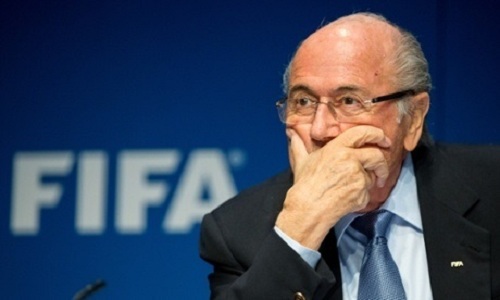2,805 total views, 1 views today
It took more aggressive resolve than expected of someone under such intense pressure from the world, but it finally happened: Joseph Sepp Blatter fell on his own sword and resigned from the pinnacle of world football as the president of its highest governing body, Federation of International Football Association (FIFA), after an unprecedented 17 years at the helm of affairs.
This came just some days after the 79-year-old Swiss won a reelection – his fifth term in office – as the top dog of the beautiful game and defiantly addressed the 65th FIFA congress, promising to steer FIFA’s ship safely to shore amid fresh allegations of corruption aimed at many of its senior officials; an ongoing event which seems to have brought his reign to an inglorious end.
His sudden resignation may have come as a surprising development, but it’s not as much of a shock. According to the president of the German Football Association (DFB) Wolfgang Niersbach, he regarded the resignation as “long overdue” as well as a “tragedy”, as he reflects that the football world “could have been spared had he done so earlier”.
The Twitter account of the Royal Dutch Football Association (KNVB) also tweeted rather enthusiastically, “Blatter is out! This is what we fought for.” It would be recalled that the president of the association, Michael van Praag unsuccessfully campaigned as a candidate against Blatter in the recent elections.
Former Portugal international, Luis Figo, another failed candidate for the FIFA presidency (he withdrew from the race before the final stages) in the recent elections also posted on Facebook, “A good day for Fifa and football. Change is finally coming.”
For a leader who appears, for all intents and purposes, to be so universally disliked in the football community, it is interesting to wonder how the Business and Economics graduate won four consecutive terms after he made the leap from the association’s general secretary role to the very top of football’s food chain and was elected president in 1998. He had also served as technical director for five years before that.
For much of his 17-year reign, FIFA under Blatter has been dogged by controversial scandals that have threatened to rock the boat of the association. His 2002 reelection victory was mired deep in allegations of “financial irregularities and backroom dealings”. He went on to win reelections in 2007 and 2011 unopposed as strings of events rendered his opponents unable to continue to compete, most notably Mohammed Bin Hamman in 2011 after he was charged with offering bribes for votes by FIFA’s Ethics committee.
Apart from the numerous corruption scandals that repeatedly rocked FIFA under Blatter’s watch, he has frequently gone at loggerheads with the football world with his unpopular ideas such as his propositions to widen the goalposts as well as eliminate draws in football matches. His unwavering stance on not introducing goal line technology into the game especially after high profile refereeing errors also did not go down well with football lovers.
Blatter also gravitated towards making foot in mouth comments about burning football issues. Some of his high profile gaffes include saying racism could be resolved on the pitch with handshakes, proposing that female football players wear tighter shorts to attract more followers as well as referring to player transfers as modern slavery. As expected, these unsavory comments from football’s leading man didn’t go unnoticed as it drew widespread ire from followers of the game.
However, despite his well publicized shortcomings as president of FIFA, Sepp Blatter will also be remembered as the man who actively pushed for more participation slots for African and Asian countries in FIFA competitions and he made significant strides in the area, as the World Cup was also hosted in Africa for the first time in the history of the competition by South Africa in 2010. FIFA’s financial revenue also went through the roof under his stewardship as the association made a leap from $882 million to $2.096 billion between 2007 and 2014.
In his resignation speech, Blatter stated that even though he had a mandate from FIFA, he didn’t feel like he had the same from the rest of the world, “the people who live, breathe and love football”. This is hardly a well-kept secret; the world has simply fallen out of love with Sepp Blatter (if it was ever in love with him to begin with). He will continue to serve on borrowed time as the president till a new one is elected; a process that will take a lot of time, already speculated as earliest as December. Regardless of whether it happens sooner or later, it is definitely game over for a very controversial leader that divided opinions like none other.
In his closing statement, Blatter said “What matters to me more than anything is that when all of this is over, football is the winner.” For the sake of the beautiful game and its horde of dedicated lovers, we hope he is right about that one.
